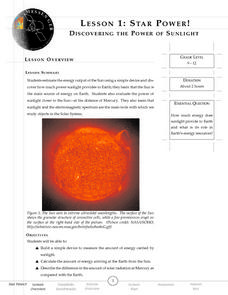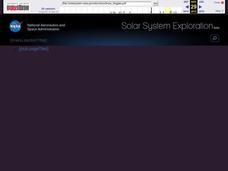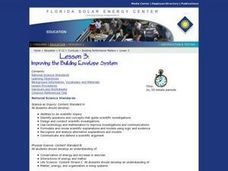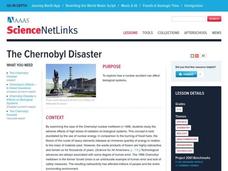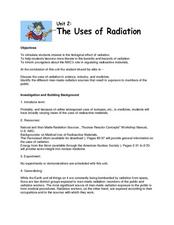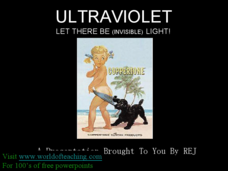Curated OER
Radiation Exposure
Students examine the levels of radiation exposure faced by astronauts on the International Space Station. After calculating their own daily radiation exposure, students compare their level of exposure to the exposure of space station...
Curated OER
Discovering The Power Of Sunlight
Learners participate in a lesson that looks at the potential for energy from sunlight. Students conduct research from a variety of resources and construct an object that is used to measure the energy of sunlight and calculate the amounts...
Curated OER
Snow Goggles And Limiting Sunlight
Learners build snow goggles similar to those used by the Inuit people. They create their version of the goggles to improve upon existing designs. Pupils compare the process used to invent snow goggles with that employed by the MESSENGER...
Curated OER
The Sun: Earth's External Heat Engine Part 1 of the Astronomy Model
Learners become familiar with the variables that control Earth's solar energy supply. They explore the source and nature of solar energy, the genesis of radiation, and the structrue of the Sun, gas spectra are observed and sample...
Curated OER
Radiation and Color
Tenth graders explore the relationship between color and heat absorption by measuring the temperature change of water in differently colored test tubes as they are exposed to a heat lamp. They work in small groups to collect data and...
Curated OER
An Overview of Solar Radiation
Students examine the Stefan-Boltzmann Law. Students compute basic radiative "constants" of the sun-Earth-atomosphere system. They examine the wavelength of maximum radiation emission.
Curated OER
TE Activity: Hot Cans and Cold Cans
Students work on problems in which they investigate conduction, convection, and radiation. They attempt to maintain the warmth in one can of soda while cooling the other as much as possible in a thirty minute period. They examine how...
Curated OER
Radioactive Decay and Half-Life
Students describe how the mass of a radioactive isotope changes with time and the factors that affect the rate of radioactive decay. They write nuclear decay equations to represent natural transmutation. This activity is accomplished...
Curated OER
Earth's Age: The Dating Game
Young scholars conduct a simulation to determine radioactive decay and half-life. Using pennies, dice or sugar cubes as isotopes placed in shoe boxes simulating rocks, they hold five trials representing 1000 years each to find the...
Curated OER
The Envelope System: A Partial Solution
Studnet identify examples of conduction, convection and radiation. They develop an example of a building envelope. They also describe how heat transfer mechanisms can affect home energy costs.
Curated OER
Improving the Building Envelope System
Students explain the different heat transfer mechanisms and how they influence the building envelope. They develop ways in which the building envelope can be improved and test hypotheses about building envelope designs.
Curated OER
Conduction, Convection, Radiation, Oh My!
Young scholars draw a line graph, and use graphing as a tool to discover more about conduction, convection and radiation. They should design their own experiment using heat sensitive paper to show they explain these 3 processes.
Curated OER
THE CHERNOBYL DISASTER
Students explore how a nuclear accident can affect biological systems. They examine the case of the Chernobyl nuclear meltdown in 1986.
Curated OER
Atmospheric Processes - Radiation
Students investigate how different surfaces absorb heat, and how the physical characteristics of a surface have a powerful effect on the way a surface absorbs and releases heat from the sun.
Curated OER
Surrounded by Radiation
Students explore ways in which people are constantly exposed to naturally occurring and man-made sources of radiation. They create and play a board game featuring different hypothetical scenarios of radiation exposure.
Curated OER
The Uses of Radiation
No visual aids, no activities, and no demonstrations accompany this plan. What you will find, is background information for a short lecture on the use of isoptopic radiation in the medical field and in our everyday lives. Should you...
Curated OER
Ultraviolet Light
A few slides at the beginning of the presentation give the definition of ultraviolet light and some important dates in its research. The role of ozone in protecting Earth from excessive radiation is mentioned. Practical applications of...
Curated OER
Half Lives
Students investigate the concept of half-life by conducting an M&M experiment. In this chemistry lesson, students differentiate nuclear fusion and fission. They present investigation findings to class.
Curated OER
Honors Biology E3 Project Instructional Plan
Ninth graders evaluate the use of radiation in medical procedures. In this biology instructional activity students compare and contrast meiosis and mitosis. They research the different applications of radiation.
Curated OER
Particle Man and the Photon
Students simulate photon transmission, scattering and absorption. In this physics instructional activity, students explain why some objects appear bright while others appear dark. They define photon and radiation in their own words.
Curated OER
Anatomy and Physiology
Students explore anatomy and physiology using various activities. In this biology lesson, students reasearch about medical radiation and its applications. They study cell cycle, cell division and other processes that sustain life.
Curated OER
AP Biology Lesson Outline
Ninth graders research the different field of bioengineering. In this biology lesson, 9th graders differentiate meiosis and mitosis. They discuss the pros and cons of using radiation in medical diagnostics.
Curated OER
AP Biology Lesson Outline
Twelfth graders research about the different careers in bioengineering. For this biology lesson, 12th graders identify the different stages in the cell cycle. They discuss the pros and cons of using radiation.
Curated OER
Making Waves with the Electromagnetic Spectrum
Students examine different types of electromagnetic waves and their sources. In this electromagnetic waves lesson students view a video and complete a handout.



